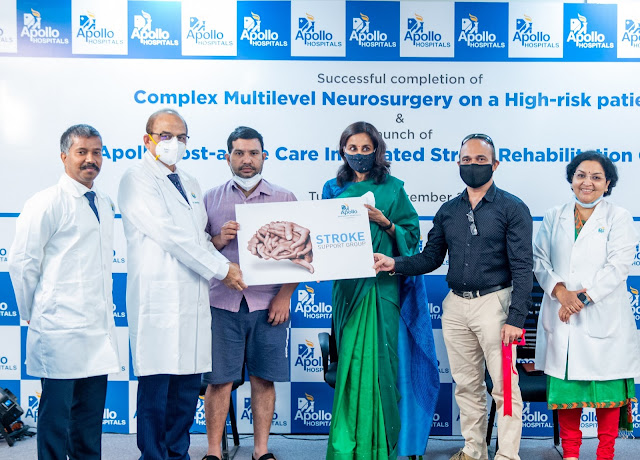Apollo Speciality Hospitals Vanagaram Saves a Young patient by performing Three Complicated Procedures
Apollo Speciality Hospitals – Vanagaram, a part of Apollo Hospitals Group one of Asia’s largest and most trusted multi-specialty chain of hospitals has performed three multi-disciplinary complicated procedures on a 35-year-old patient, who had an Ischemic stroke.
Mr. Ramkumar, from Chennai was brought to Apollo
Hospitals Vanagaram with a sudden inability to use his left arm and leg and
with symptoms of facial paralysis. He was brought into the hospital in a drowsy
condition and was only able to respond to doctor’s queries feebly. He had a
vision loss in his left eye and also his eye was deviated to right side.
The patient showed every possible symptom for
stroke, Dr. P.R. Prabash, Consultant Neurologist, Apollo Specialty Hospital,
Vanagaram diagnosed the patient with stroke (with NIHSS) scale of 18.Urgent MRI (DWI)screening
revealed a large infarct in the right middle cerebral artery territory. The
blood supply to the large part of the right side brain had reduced due to a
clot in the major blood vessel supplying blood to that part of the brain. MR
ASPECT score was very low (2), indicating poor outcome. After informed consent,
Thrombolysis (Injecting a clot bursting medication through his veins) was
planned immediately.
Based on the patient’s condition Dr. Swatee Halbe,
Interventional Radiologist, was called in.
After team discussion, it was decided to do bridging procedure- ie-
Thrombolysis followed by Mechanical thrombectomy (passing a wire through his
artery, reaching the location of the clot and mechanically remove it out). The
patient underwent Thrombolysis followed by Mechanical Thrombectomy and the clot
was removed and the blood vessel was revascularised. He was shifted back to ICU
and was connected to ventilator support.
On repeating the CT scan there was a swelling in the
right side brain which was about to compress and damage the left side brain. On
Dr. Siddhartha Ghosh. Senior Neurosurgeon, recommendation the swelling was
treated initially with medications, but since the pressure was rising, it was
decided to proceed with emergency decompressive craniectomy, which is removing
one part of the skull to release the pressure that built up inside the cranium.
Post procedure he was shifted back to ICU and mechanical ventilation was
continued. Patient gradually started to improve and has been discharged. He is
now undergoing Neuro Rehabilitation and is communicating well and is able to
walk with minimal support.
Speaking during the press meet, Ms. Suneeta Reddy,
Managing Director, Apollo Hospitals Group said, “The Apollo Institute of
Neurosciences provides state-of-the art neuro care in the country. The treatment
delivered at our hospitals are in-par with any leading healthcare institutions
in the world. All our comprehensive stroke centers are equipped with 24X7
stroke team along with high-precision CT, MRI facilities with the capability of
performing specialized surgical and interventional procedures in no time.”
She also added, “We had recently launched AI
technology-enabled advanced stroke management,
the AI platform uses artificial intelligence to create high quality,
advanced images from non-contrast CT, CT angiography, CT perfusion, and MRI
diffusion and perfusion scans, helping hospitals to improve time-critical
triage or transfer decisions and facilitate better patient outcomes. The stroke
team will be able to remotely access the brain scans of stroke patients with
the AI analysis on the mobile app or email for faster decision making without
losing time.”
Apollo speciality hospitals, Vanagaram, Chennai is a
comprehensive stroke care centre. The Stroke unit was launched 4 years ago. Not
surprisingly, we are learning from literature as well as from our own rich
experience that organized stroke unit care is consistently associated with
better outcomes. Having done exemplary work over past 4 years with good results
- as a natural progression, launching inpatient Stroke Rehabilitation centre -
Apollo “Post-Acute Care” Integrated
Stroke Rehabilitation Centre.
Newer avancements including thrombolysis,
thrombectomy, timely decompressive craniectomy and improving awareness about
stroke leading to faster “onset to needle time” - mean people are surviving
strokes that would have killed them in the past. There is no doubt that, more
people are surviving stroke than did in the past. Unfortunately, many of those
who survive a stroke experience chronic deficits that affect their quality of
life, mobility, and independence.
Speaking during the press meet Dr.Siddhartha Ghosh
said “Awareness in the community, prompt diagnosis, acute management (including
thrombolysis, thrombectomy, timely decompressive craniectomy, and airway
management), post-Acute care rehabilitation are the cornerstones in achieving
good results in stroke management”
Dr.P.R.Prabash said “The thrombectomy window period
has been extended to 24 hours (in selected patients), so reaching hospital as
early as possible is the key. To take this important message to the masses,
Apollo hospitals Vanagaram is conducting a four day awareness road rally from
Chennai to Kanyakumari dotted with awareness talks in all major towns enroute,
on second week of December 2020. Other important message is - Post stroke
Rehabilitation measures are a necessity, not a luxury”.
Post stroke rehabilitation is a very important phase
for a patient’s complete recovery. The long-term goal of rehabilitation is to
help improve the stroke survivor's physical and cognitive functions, to relearn
the skills they have lost, and to ultimately improve their overall quality of
life so that they can become as independent as possible. Apollo Post-Acute Care
Integrated Stoke Rehabilitation Centre & Stroke Support Group was launched
today by the stroke hero- Mr. Ramkumar.
Stroke support groups are one way for stroke
survivors and caregivers to receive beneficial psychological and social support
after a stroke, and are unique because the shared experiences enable peers to
understand others and allow them to provide and receive relevant emotional,
affirmational, and informational support. Also, for stroke survivors, providing
support for peers has been shown to be beneficial because those providing
support enjoy it, feel a sense of personal growth from providing it, and feel
they are making a difference in someone else’s life.





Comments
Post a Comment